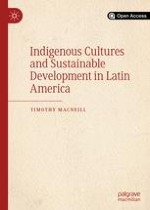Open Access 2020 | Open Access | Buch

Indigenous Cultures and Sustainable Development in Latin America
verfasst von: Timothy MacNeill
Verlag: Springer International Publishing
Open Access 2020 | Open Access | Buch

verfasst von: Timothy MacNeill
Verlag: Springer International Publishing
This open access book outlines development theory and practice overtime as well as critically interrogates the “cultural turn” in development policy in Latin American indigenous communities, specifically, in Guatemala, Honduras, Ecuador, and Bolivia. It becomes apparent that culturally sustainable development is both a new and old idea, which is simultaneously traditional and modern, and that it is a necessary iteration in thinking on development. This new strain of thought could inform not only the work of development practitioners, graduate students, and theorists working in the Global South, but in the Global North as well.